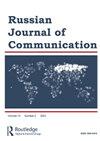‘Intelligentsia’: the vanished concept and its aftermath
Q1 Social Sciences
引用次数: 0
Abstract
Yuri Levada and his team took a keen interest in the Russian intelligentsia. Their ongoing research was stimulated by the need to identify those forces that can initiate changes in the Soviet system and transform it into a more open and democratic society. In this context, the intelligentsia was reputed to be an elite group capable of articulating new moral and behavioral norms, disseminating them throughout society, and influencing the most receptive social strata. This outlook, consistent with the traditional view of the intelligentsia in Russia, comports with the well-known model of ‘transmitting ideas’ in social and cultural anthropology, as well as with the models of sociocultural change found in the works of Abraham Moles and Norbert Elias’ theory of the ‘civilizing process.’ Empirical sociological studies that we conducted before and during perestroika and its aftermath lent credibility to this approach. Between 1985 and 1990, the consolidation of national elites in republics of the Soviet Union had been facilitated by the flurry of publications in national languages. In Russia, informal public associations spearheaded by scientists, teachers, journalists, writers, artists, and other members of the intelligentsia facilitated a similar transformation. Public opinion polls, made possible after the founding of VCIOM (the Russian Public Opinion Research Center), demonstrated that the vector of change was directed by the most advanced societal groups – highly educated young residents of major Russian cities demanding institutional reforms, the foremost of which were ending the Communist Party’s monopoly and establishing a market economy. After the collapse of the USSR, the mass support for political reforms of Gaydar’s government, which was led chiefly by academics and political scientists, gave more weight to this interpretation. However, at the end of 1991, doubts as to whether the intelligentsia was really ‘the elite’ arouse, with the doubts increasing through this decade (Gudkov & Dubin, 1991, pp. 97–99). It soon became clear that the ‘intelligentsia,’ or the educated class, finding itself incapable of putting the proclaimed course of reforms into practice, was yielding leadership to the former Communist/Soviet or economic nomenklatura (now operating under a different name). This forced us to reconsider the interpretation of the intelligentsia as the ‘elite.’ In the standard sociological definition of ‘elite,’ this category is identified as fulfilling three main“知识分子”:消失的概念及其后果
尤里·列瓦达和他的团队对俄罗斯知识分子有着浓厚的兴趣。他们正在进行的研究是由于需要确定那些能够在苏联制度中发起变革并将其转变为一个更开放和民主的社会的力量。在这种背景下,知识分子被认为是一个精英群体,能够阐明新的道德和行为规范,在整个社会中传播它们,并影响最容易接受的社会阶层。这种观点与俄罗斯知识分子的传统观点一致,符合社会和文化人类学中著名的“传播思想”模型,也符合亚伯拉罕·莫尔斯(Abraham mole)和诺伯特·埃利亚斯(Norbert Elias)的“文明过程”理论中发现的社会文化变化模型。我们在改革前、改革中以及改革后进行的实证社会学研究为这种方法提供了可信度。1985年至1990年期间,苏联各加盟共和国的民族精英的巩固得益于大量以民族语言出版的出版物。在俄罗斯,由科学家、教师、记者、作家、艺术家和其他知识分子领导的非正式公共协会促进了类似的转变。在VCIOM(俄罗斯民意研究中心)成立后进行的民意调查显示,变革的方向是由最先进的社会团体引导的——俄罗斯主要城市受过高等教育的年轻居民要求体制改革,其中最重要的是结束共产党的垄断和建立市场经济。苏联解体后,主要由学者和政治科学家领导的盖达尔政府的政治改革得到了广泛的支持,这给这种解释增加了更多的份量。然而,在1991年底,关于知识分子是否真的是“精英”的质疑引起了人们的怀疑,这种怀疑在这十年中不断增加(Gudkov & Dubin, 1991, pp. 97-99)。很快就清楚了,“知识分子”或受过教育的阶级,发现自己无法将所宣布的改革付诸实践,正在把领导权让给前共产主义/苏联或经济权力派(现在以不同的名义运作)。这迫使我们重新考虑将知识分子解释为“精英”的问题。在“精英”的标准社会学定义中,这一类别被认为满足了三个主要方面
本文章由计算机程序翻译,如有差异,请以英文原文为准。
求助全文
约1分钟内获得全文
求助全文
来源期刊

Russian Journal of Communication
Social Sciences-Political Science and International Relations
自引率
0.00%
发文量
0
期刊介绍:
Russian Journal of Communication (RJC) is an international peer-reviewed academic publication devoted to studies of communication in, with, and about Russia and Russian-speaking communities around the world. RJC welcomes both humanistic and social scientific scholarly approaches to communication, which is broadly construed to include mediated information as well as face-to-face interactions. RJC seeks papers and book reviews on topics including philosophy of communication, traditional and new media, film, literature, rhetoric, journalism, information-communication technologies, cultural practices, organizational and group dynamics, interpersonal communication, communication in instructional contexts, advertising, public relations, political campaigns, legal proceedings, environmental and health matters, and communication policy.
 求助内容:
求助内容: 应助结果提醒方式:
应助结果提醒方式:


